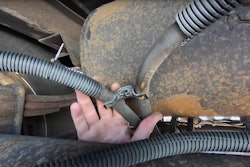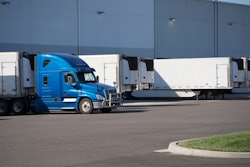The Federal Motor Carrier Safety Administration in a Federal Register notice dated Monday, Aug. 14, said it will consider petitions for waivers from its decisions to preempt California and Washington state’s Meal and Rest Break (MRB) rules. The move in effect opens a new door for CDL drivers who want the rules to apply to them, or for the states themselves, to challenge FMCSA's preemption determination.
While petitions for waivers can be submitted at any time, FMCSA requested that any petitions for waiver of the preemption determinations be submitted by Nov. 13. The agency said it will publish any petitions for waiver that it receives and will provide an opportunity for public comment with respect to the petitions.
California’s law requires employers to provide non-exempt employees a 30-minute meal break if they work more than 5 hours in a day, and employees who work a shift of 10 hours or more are entitled to a second 30-minute meal break. The rule also requires employers to provide rest periods for non-exempt employees who work three-and-a-half or more hours in a day. Employees are entitled to a 10-minute rest period for each 4 hours, or a substantial fraction thereof, that they work in a day.
In Washington, employers must provide employees a meal period of at least 30 minutes that starts after the second hour and before the fifth hour after the shift begins. Additionally, Washington’s MRB rules provide for a 10-minute rest period “for each four hours of working time” and must occur no later than the end of the third working hour.
On Dec. 21, 2018, FMCSA granted petitions filed by the American Trucking Associations and the Specialized Carriers and Rigging Association, and determined that California’s MRB rules are preempted by federal hours of service rules. On Nov. 27, 2020, FMCSA granted a petition filed by the Washington Trucking Association, determining that Washington’s MRB rules are also preempted by federal regulations. In granting these petitions, FMCSA said it determined the states’ MRB rules are more stringent than federal regulations and that they meet the three potential criteria for preemption under U.S. code.
The Teamsters union signaled support for the FMCSA's move: "FMCSA Administrator Robin Hutcheson is taking steps in the right direction by accepting applications for waiver petitions,” said Teamsters General President Sean M. O’Brien. “States should have the freedom to protect motorists and workers by implementing stronger meal and rest break requirements for professional drivers. This prevents tragedy -- not just for commercial vehicle operators, but for everyone who uses our highways.”
ATA President and CEO Chris Spear, in a statement Aug. 11, voiced opposition to FMCSA calling for waiver requests, saying truck drivers should have a "singular, national standard of work rules."
"Congress first addressed this issue decades ago by passing F4A, and the U.S. DOT’s authority to preempt state rules was unanimously reaffirmed in a 2021 ruling by the U.S. Court of Appeals for the Ninth Circuit," he said. "Federal law already mandates rest breaks for drivers. Unnecessary and duplicative state laws are not grounded in safety and have been primarily enforced via private lawsuits designed to extort the trucking industry."
Spear added that "opening the door to this spurious litigation once again would impair the safe and efficient movement of interstate goods," adding that “ATA is fully prepared to oppose this effort that would result in a confusing patchwork of regulations. We will leverage all of our federation’s resources to stop this in its tracks.”
David Heller, the Truckload Carrier Association's Senior Vice President of Safety and Government Affairs, said TCA "opposes any effort to institute the California and Washington state meal and rest break laws and supports the implementation of the federal rules pertaining to meal and rest breaks."
[Related: DOT exempts carriers from California’s break laws]
In its new notice, the agency said that it is allowed to grant waivers from preemptions, as a provision in the U.S. code states that a person, or state, can petition for a waiver of a decision that a state law or regulation may not be enforced.
In accepting waivers from the preemptions, FMCSA lays out just how a person or state can and should request the waiver. The agency said petitioners must demonstrate that a waiver “is in the public interest and is consistent with the safe operation of CMVs,” adding that it “encourages waiver petitioners to include arguments that do not depend on a conclusion that the agency’s preemption determinations were erroneous.”
FMCSA asks that waiver requests address the following topics:
- Whether and to what extent enforcement of a state’s meal and rest break laws with respect to intrastate CMV drivers has impacted the health and safety of drivers.
- Whether enforcement of state meal and rest break laws as applied to interstate CMV drivers will exacerbate the existing truck parking shortages and result in more trucks parking on the side of the road, whether any such effect will burden interstate commerce or create additional dangers to drivers and the public, and whether the applicant intends to take any actions to mitigate or address any such effect.
- Whether enforcement of a state’s meal and rest break laws as applied to interstate CMV drivers will dissuade carriers from operating in that state, whether any such effect will weaken the resiliency of the national supply chain, and whether the applicant intends to take any actions to mitigate or address any such effect.
Swift and U.S. Xpress, before they were under the same company umbrella, each won court cases against drivers claiming that the companies didn't provide the state-mandated breaks. Other carriers haven't been so lucky -- small fleet AB Trucking, based near and serving the Oakland, California, port, lost a similarly focused case detailed at this link.
[Related: A small fleet v. the Teamsters]












